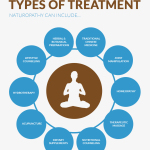It seems that almost everyone is “gluten-free” these days. I often hear the following Frequently Asked Questions surrounding the gluten and dairy-free phenomenon: Is this a trend? If these people have gluten allergies, why don’t they need to carry an epi-pen? Is this just a weight loss fad? For answers, read on for a naturopathic medical student’s explanation about food sensitivities.
Our immune systems are powerful things, they prevent us from the deadly pathogens we encounter daily (even those that happily reside in our own bodies). When we get sick, it is often not the bug that causes our symptoms, but our own body that creates inflammation and feelings of lethargy and malaise as it fights the pathogen. As necessary as our immune systems are, they also have the potential to attack the cells of our own bodies, which we see in a class of diseases termed autoimmune diseases. Our gastrointestinal tract also has a powerful immune system of its own because it is important for our body to ensure the harmful pathogens that we accidentally ingest don’t enter the rest of our body. This immune system, however, has the potential to react to non-harmful substances, like food proteins, and cause detrimental effects to our body. This is known as a food allergy.
There are many types of immune reactions but one of the most common is the IgE (a type of antibody) hypersensitivity reaction. This is the reaction experienced by people with hayfever and anaphylaxis (from peanut allergies, for example). In these reactions, the body reacts to the otherwise non-harmful substance, such as a peanut, in a severe manner – potentially causing the throat to swell to the point where it closes, causing suffocation. This is why people with peanut allergies must take extreme caution to avoid the source of their food allergy.
When someone claims to be allergic or “sensitive” to gluten or dairy, however, they are likely referring to an IgG mediated immune reaction, which causes different effects, to varying degrees. Rather than the very acute, life-threatening effects of some IgE anaphylactic immune reactions, IgG-mediated reactions often manifest as inflammation and chronic disease. In these types of food allergies, there is often the presence of “leaky gut” or intestinal permeability. A normal intestine has rows of cells into which food molecules enter. These cells are normally tightly linked by molecules called “tight junctions”, which prevent food molecules (proteins, fats and sugars) from entering the spaces between the cells. This means that food molecules must go through the cells in order to get into the rest of the body. When food enters our gut it is broken down by enzymes into its most minute particles and absorbed into intestinal cells. In a normal, healthy body, we do not want complex particles of food to get into our blood stream. When large proteins are found in our blood, our body sees them as being foreign and potentially harmful, and our immune system attacks them.
In a person with leaky gut, however, the junctions between the intestinal cells are broken and spaces are created between the cells. When food is taken in, whole proteins from the food (gluten is the protein found in wheat and casein is the protein in dairy products) slip through the spaces between the intestinal cells and enter the blood stream in large pieces. The immune system then attacks these proteins, causing a series of unpleasant events, mostly involving inflammation and feelings of malaise. Many scientists claim that chronic inflammation is the cause of all major disease. Scientists are unsure what causes leaky gut, but some theories include general inflammation from stress, excessive alcohol consumption or a lack of friendly gut bacteria that keep the “bad” bacteria from taking over and wrecking havoc. However, there is an increasing body of evidence showing that leaky gut may be caused by a hyper-reaction of the gut’s immune system to certain foods. These proteins then enter through the spaces between the cells into the bloodstream and to the rest of the body, causing a widespread array of unpleasant symptoms.
Most naturopaths profess that autoimmune-type diseases, inflammatory diseases, gastrointestinal complaints and some cases of psychiatric disorders coexist with some form of food intolerance and that, when the food that the patient is sensitive to is removed, the disease symptoms go away. Examples of diseases that may be a result of food sensitivities include:
migraines
acne or other skin conditions
Lupus
Arthritis and gout
Irritable Bowel Syndrome or Inflammatory Bowel Disease
GI complaints such as bloating, gas or constipation
Ulcerative colitis and Crohn’s
Celiac disease (specifically defined as an allergy to gluten, the protein in wheat, rye and barley)
Psychiatric disorders, such as depression, schizophrenia or anxiety
Asthma
Childhood ADHD
Autism
Any disease in which there is pain or inflammation
And the list goes on.
Naturopathic testing for food intolerances involve the Elimination Diet, which is a strict removal of all foods that are common causes of sensitivities. My clinical nutrition professor claims that in the majority of cases, gluten and casein (from dairy products) are the culprit. The foods are removed for 30 days and most patients experience a complete reversal of their pain and symptoms. Our professor told us an amazing story about a patient with autism who, at the age of 9 years old, began to talk for the first time after eliminating an allergy-causing food and then proceeded to live a normal life.
At the end of the removal phase, the patient is then asked to reintroduce the foods, in a controlled and systematic fashion, under the guidance of their naturopathic doctor. If symptoms return upon reintroducing a certain food, then that food is deemed the culprit and, if they want to remain free of disease, they are advised to avoid that food for life. Being gluten or dairy-free may be a difficult lifestyle change for some individuals, but, for most, it is a small inconvenience compared to the incredible results they experience. Also, due to the growing understanding about the prevalence of food sensitivities, many gluten-free options and dairy alternatives are available at most restaurants and grocery stores.
Medical doctor Alan R. Gaby, wrote an excellent paper examining studies of patients with migraine headaches, irritable bowel syndrome (IBS), asthma, arthritis and ADHD. When put on the Elimination Diet, 92% of the migraine sufferers and 91% of the people with arthritis experienced complete reduction of symptoms. No drug in the world has shown to produce results like that!
For the full paper, and the rest of the results, click here: http://www.altmedrev.com/publications/3/2/90.pdf
The Elimination Diet is a powerful naturopathic tool and has shown to improve and cure many patients’ symptoms. It’s a great example of “identifying and removing the cause of disease”, which is one of the 6 principles of naturopathic medicine. If you are interested in seeing how this diet may help you identify a food allergy and experience freedom from your symptoms, please contact a naturopathic doctor in your area.
Also check out http://www.elanaspantry.com/ or more of this blog, Art and Practice, for some excellent gluten and dairy-free recipe ideas!






